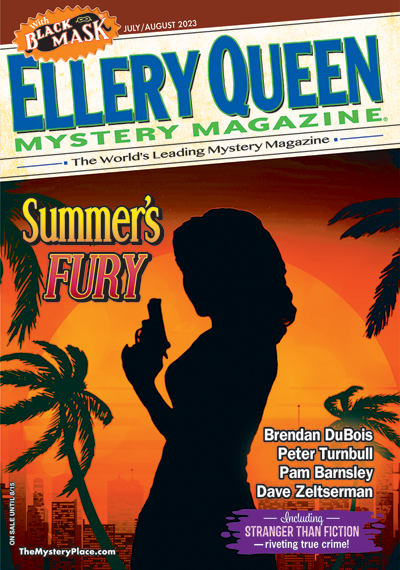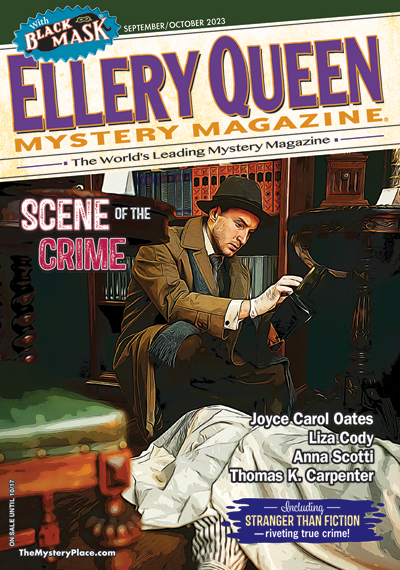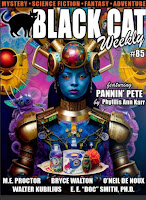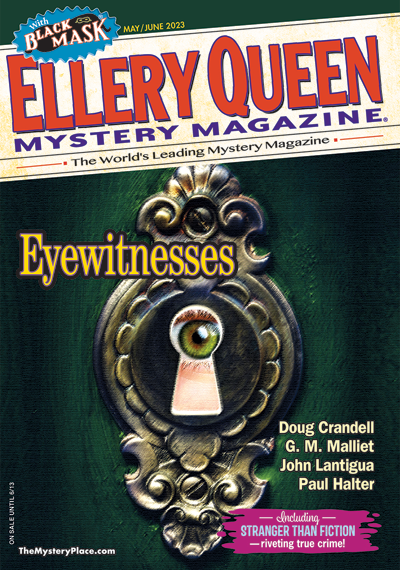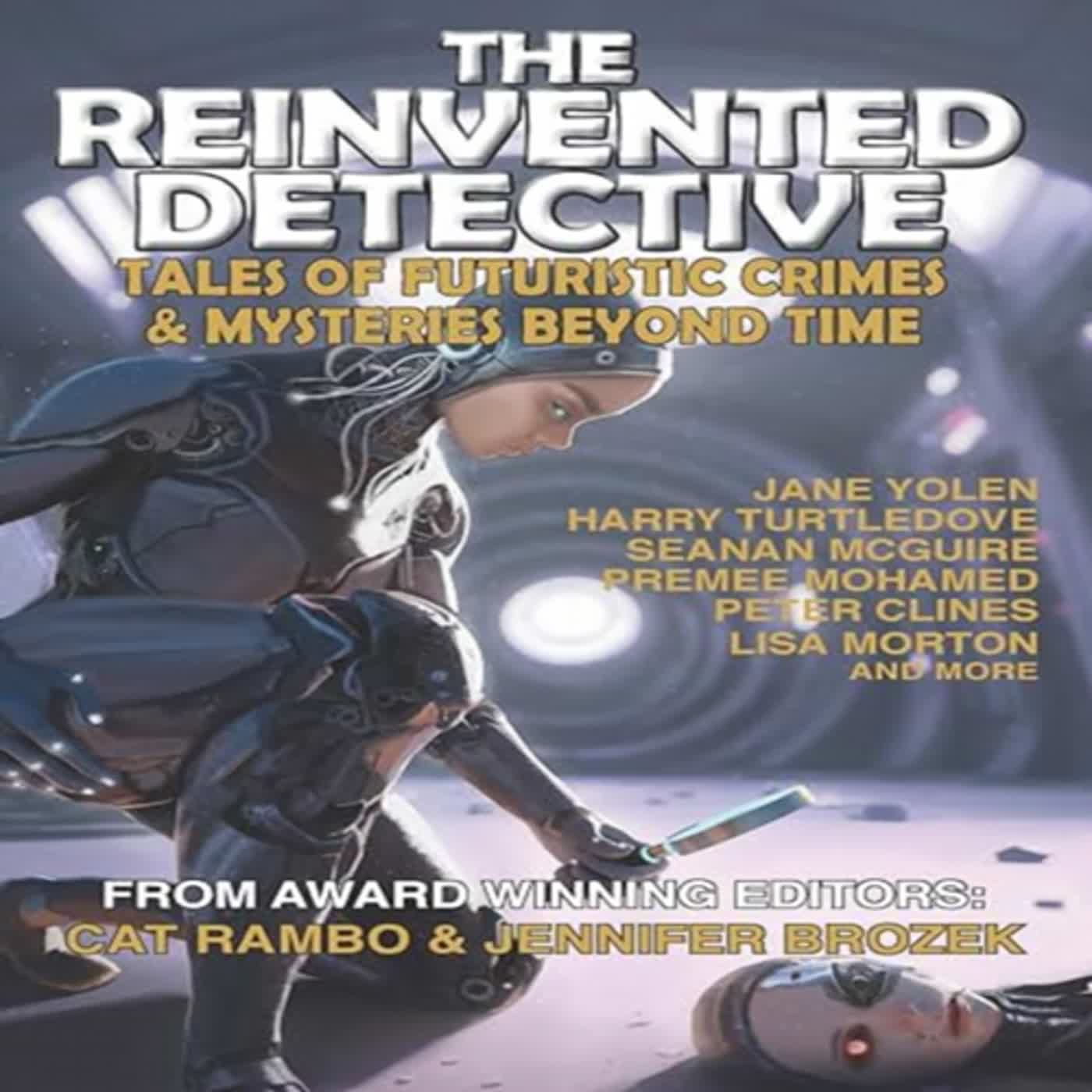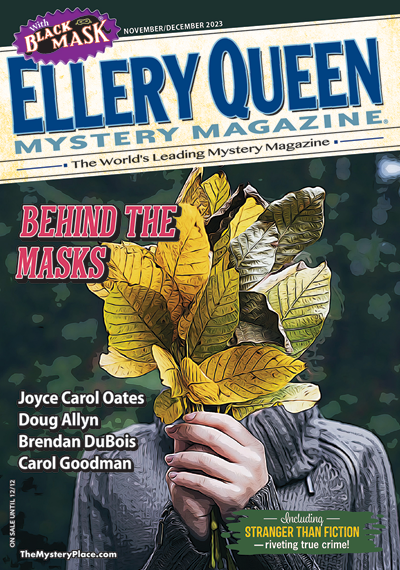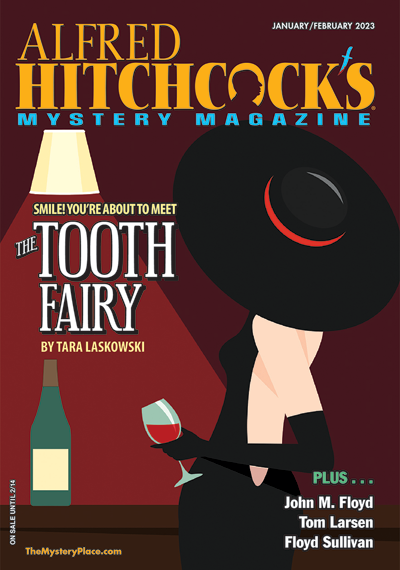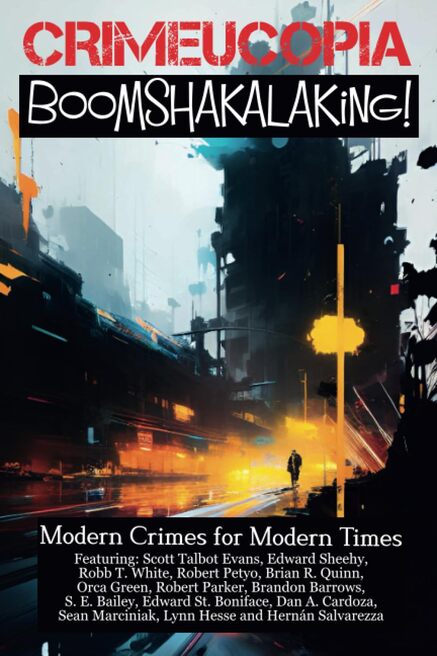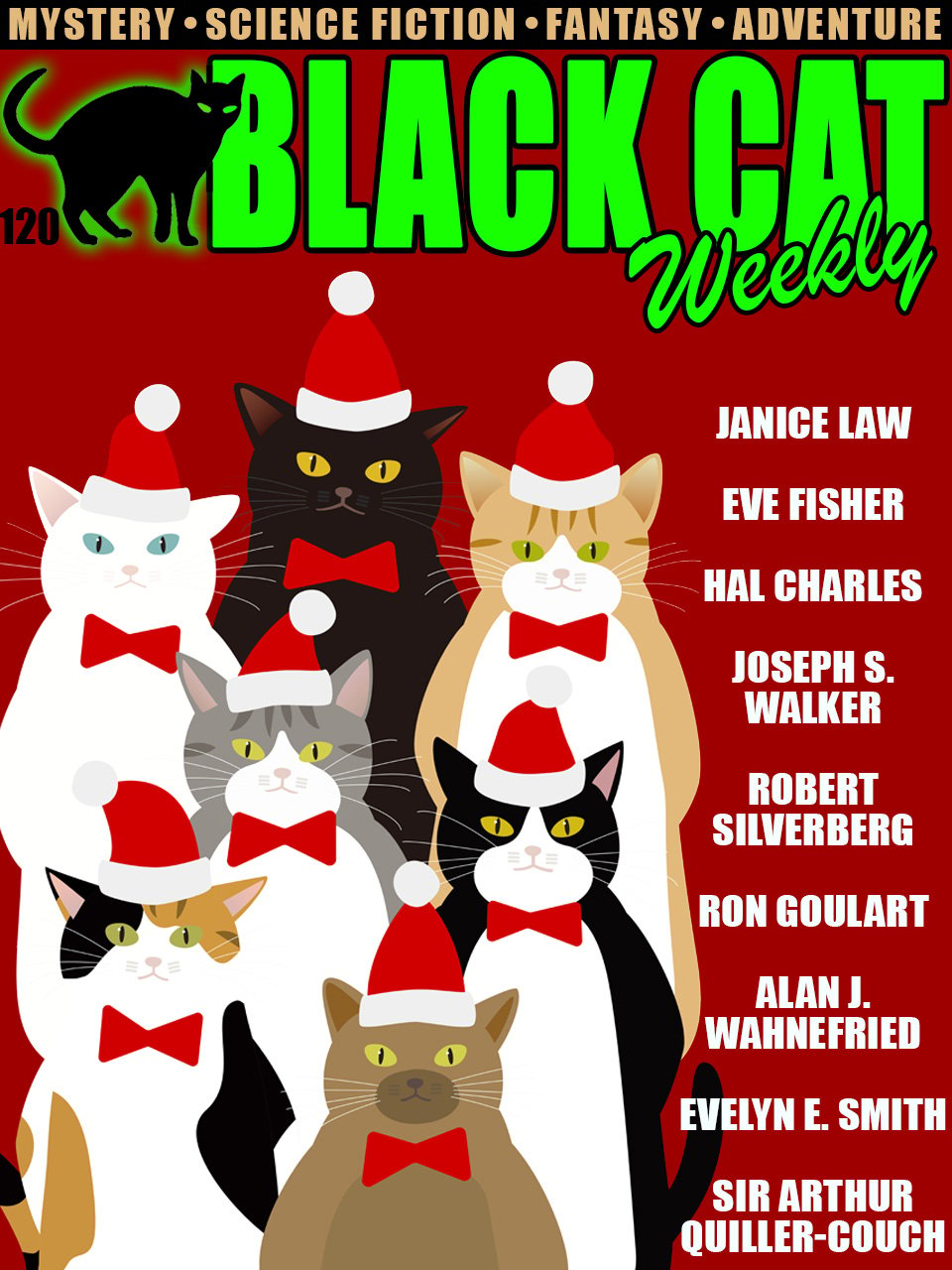This is my fifteenth annual review of the best short stories of the year, selected from my weekly-best choices at Little Big Crimes. Feel free to cite this list but please refer to it as "Robert Lopresti's Best of the Year list at SleuthSayers" or similar phrasing, NOT "SleuthSayers Best..." because my fellow bloggers are stubbornly independent souls who occasionally disagree with me, as foolish as that seems.
There are sixteen winners this year, one more than last time. Thirteen of the stories are by men; three by women. Ellery Queen's Mystery Magazine is the big winner, with six tales. Black Cat Weekly scored two, as did an anthology from Random House. Five were written by my fellow SleuthSayers.
Six of the stories are funny. Five have fantasy or science fiction elements. Two are private eye stories. Two are police stories. Two are by foreigners. Seven of the authors are repeat offenders.
Enough. Please pass me the envelopes.
Aymé, Marcel "Martin, the Novelist," in Ellery Queen Mystery Magazine, July/August 2023.
Martin is a successful novelist with one great flaw. He kills off his characters. His publisher extracts a promise that no one important will die in his next book, or no money.
That's hard enough for Martin to bear but even worse is a visit from one of his characters, who is very unhappy with the plot. Everybody's a critic, right?
This is Cody's third appearance on my best list.
Sheena, the narrator of this tour-de-force novella, is a horrible person. She never refers to her only child as anything but "the annoying kid." She has nothing but insults for her only two friends, one of whom she says "I don't like much."
But worse, when she decides that "the marriage was worn as thin as the hall carpet," she set her sights on an artist. The fact that he had been in a relationship for decades only made it more of a challenge. Sheena is a scary, narcissistic, probably delusional, menace. You wouldn't want to meet her, but she makes a fascinating protagonist.
De Noux, O'Neil, "Of Average Intelligence," in Black Cat Weekly, #85.
My friend and fellow SleuthSayer is a retired police officer, and it shows.
"No offense, Office Kintyre. But I'm smarter than you."
Have you taken offense yet? I certainly have. Attorney Matt Glick is the speaker and he has recently killed his wife. The cops have a ton of circumstantial evidence against him and he has a ready explanation for every bit of it.
In fact the only thing Glick doesn't have a ready work-around for is his own smug superiority,...
Dean, David, "Mrs. Hyde," in Ellery Queen's Mystery Magazine, March/April 2023.
This is my friend and fellow SleuthSayers' fifth appearance on this list, which makes him champeen of the world. No one else has been in more than four times.
Dr. Beckett Marchland is an alienist, which is to say, a Victorian-era psychologist. He receives a troubling letter from a woman who reports that her once loving and kindhearted husband is being changed for the worse by a bad companion.
The woman is Mrs. Edward Hyde. The wicked friend is Dr. Henry Jekyll.
Faherty, Terence, "The Incurious Man," in Ellery Queen's Mystery Magazine, May/June 2023.
This is the fourth appearance here by yet another .SleuthSayer alum.
Owen Keane is a private detective starting a new job. On his first day, taking the train from New Jersey to New York City, he encounters something very strange. Every day for a week a woman near Rahway has held up a sign for people on the train to see. The signs seem ominous, if not threatening, and refer to Giovanni and Elvira, whoever they are.Everyone on the train is fascinated by the signs except one man who ignores them. His lack of interest interests Keane...
Finlay, C.C. "The Best Justice Money Can Buy," in The Reinvented Detective, edited by Cat Rambo and Jennifer Brozek, Caezik SF and Fantasy, 2023.
What if the whole justice system was for-profit? Crimes would not be investigated unless the victims, or someone else, pay for the police time. Criminals could shell out dough to get out of prison. (Well, today we call that hiring a good lawyer, don't we?) And so on.
Detective Chung is not a fan of the for-profit system but today it works in her favor, because she eye-witnessed the son of the wealthiest woman in the country committing a hit and run. And this gives her leverage, if she can figure out how to use it...
Helms, Richard, "Spear Carriers," in Ellery Queen Mystery Magazine, November/December 2023.
This is the third time Helms had made my best of the year list.
Dave and Sam have bit parts in a Broadway play, as policemen. They only show up at the very end which leaves them with a lot of time on their hands. One night Dave goes out for a bite in his police uniform-costume and the clerk gives him his food for free. "Thank you for your service."
This happens because Dave is wearing his costume - which is to say, something that looks very much like a police uniform. . That gives Sam an idea...
Hockensmith, Steve, "The Grown-Ups Table," in Alfred Hitchcock's Mystery Magazine, January/February 2023.This is the third best-of-the-year appearance by SleuthSayer Hockensmith. 2023
But the main character is Tia who has just graduated to the Grown-Ups Table. And she is carefully orchestrating the dinner conversation to reveal who murdered the family matriarch, Gammy Bibi.
Linn, Ken, "A Flash of Headlights," in Ellery Queen's Mystery Magazine, May/June 2023.Brody does yard maintenance. A year earlier he was charged with a DUI. He has been sober ever since, just barely. He makes a casual spur-of-the-moment decision to do what he considers a friendly gesture. This leads to a tragedy which affects people he cares about. Every move Brody makes feels like it will make things worse.
Narvaez, Richie, "Shamu, World's Greatest Detective," in Killin' Time in San Diego, edited by Holly West, Down and Out Books, 2023.
Shamu is an orca at SeaWorld (the eighteenth to bear that name) and thanks to new technology she is able to communicate with people. Turns out she is, as the title says, a brilliant detective. The story is narrated by her assistant, Angie Gomez.
One of the pleasures of this story is Shamu's dialog. Here she is talking to her police nemesis: "I can solve the case in time for you to get home and rest your minuscule human brain."
Petrone, Susan, "The Silent Partner," in Cleveland Noir, edited by Michael Ruhlman and Miesha Wilson Headen, Akashic Press, 2023.
The publisher sent me a free copy of this book.
It's 1970. The narrator writes about baseball history for the Cleveland Press. He has to cover the 50th anniversary of the day a Cleveland player was killed by a pitch thrown by a Yankee.The more he investigates the more it appears that something weird happened. Weird, like the beanball being deliberate? Much weirder than that.
Roanhorse, Rebecca, "White Hills," in Never Whistle at Night: An Indigenous Dark Fiction Anthology, edited by Shane Hawk, and Theodore C. Van Alst, Jr., Random House, 2023.
White Hills is everything Marissa ever wanted, right down to the welcome sign by the community mail drop reminding everyone of the HOA rules. Some people don't like HOAs, but Marissa loves them.
Marissa is perhaps a bit shallow and self-satisfied with her wealthy new husband. She constantly rattles off popular cliches and mantras. But does she really fit in in White Hills?One night she springs two surprises on her husband. The one she is excited about: she's pregnant. The one she didn't give a thought to before mentioning: she's part Native American. And suddenly things change...
Sheehy, Edward, "Lavender Diamond," in Crimeucopia: Boomshakalaking! Modern Crimes for Modern Times, Murderous Ink Press, 2023.
I'm done writing first-person point-of-view stories. My latest saga of a modern family stretching back several generations, voiced by 72 first-person characters including pet dogs and cats and a crow circling the narrative dispensing omniscient commentary, had been soundly rejected by dozens of publishers.
So says our protagonist. But it gets confusing he visits a library where he encounters...A tall dude, six-feet-four with a shaved head, wore a gold chain over a tight turtleneck that showed off a thick musculature gained from years of pumping iron at Cumberland Correction on a narcotics charge. Inside the joint the dude known as Craz had been the leader of a brutal and murderous prison gang.
How does he know all this? Have we wandered into third person omniscient narration? Hmm...
Thielman, Mark, "Steer Clear," in Reckless in Texas: Metroplex Mysteries, Volume 2, edited by Barb Goffman, North Dallas Chapter of Sisters in Crime, 2023.
This is the fourth time my fellow SleuthSayer has appeared in this list.
As punishment for an indiscretion with his boss's ex-wife Detective Alpert of the Fort Worth Police has been assigned to look into the disappearance of a steer. Funny story with a satisfying solution.
Van Camp, Richard, "Scariest. Story. Ever," in Never Whistle at Night: An Indigenous Dark Fiction Anthology, edited by Shane Hawk, and Theodore C. Van Alst, Jr., Random House, 2023.
The narrator has just made it to the finals of the "Scariest. Story. Ever." contest using a story he learned from a village elder. Tomorrow he will be flown to Yellowknife for the finals. He needs to find an even better story to tell, so he goes to another elder, his Uncle Mike, and tries to convince him to tell him a properly horrifying tale. Is this a crime story? Sort of. Definitely. Read it and see.
Walker, Joseph S., "A Right Jolly Old Elf," Black Cat Weekly, #120, 2023.
This is the third story by my friend to make the best of the year list.
Marty is a no-talent who manages to marry into an influential family. Sounds good, right? Alas, the family happens to be the Irish mob. They get tired of him being useless and decide he has to become part of a robbery. He will attend an office party dressed as Santa while his two brother-in-laws, dressed as elves, slip off to rob another office. What could possibly go wrong?

